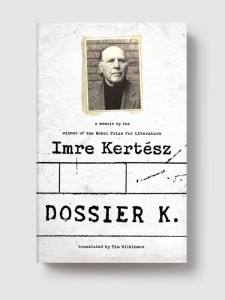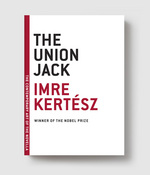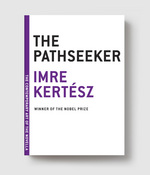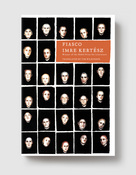
List price: $18.95
- Pages224
- ISBN 9781612192024
- Publication dateMay, 2013
- Categories
- Booksellers
- Media
- Academics & Librarians
Dossier K
A Memoir
IMRE KERTÉSZ
Translated by Tim Wilkinson
The first and only memoir from the Nobel Prize-winning author, in the form of an illuminating, often funny, and often combative interview — conducted by the author of himself.
Dossier K is Imre Kertész’s response to the hasty biographies and profiles that followed his 2002 Nobel Prize, an attempt to set the record straight. But, as befits Kertész, it’s a beautifully roundabout way of going straight: Kertész faces and interrogates himself about the issues and events that have long preoccupied him, while also dealing with the questions that really annoy him (such as, “Is your work autobiographical?”).
The result is an extraordinary self-portrait, in which Kertész recounts memories of his childhood in Budapest; the years that lead up to the Second World War and his first encounters with anti-Semitism; the incredible forged record of his death in Buchenwald that may in fact have saved his life; his release from the camps and his return to his family; Hungary’s Rákosi and Kádár regimes and the terror, hypocrisy, and absurdity they entailed; his thoughts about what other writers have written about the Holocaust; his two marriages; and his long development as a writer.
This is a surprising and provocative autobiography that delves into questions about the legacy of the Holocaust, fiction and reality, and what Kertész calls “the wonderful burden of being responsible for yourself.
“An account of [Kertesz] that is as original, complex and open to contradiction as the rest of his life’s work.” —New York Times Book Review
“It is our great fortune and the great misfortune of the Holocaust’s authors that so many remarkable talents emerged from the destruction: Paul Celan, Jean Améry, Nelly Sachs, Primo Levi, and lesser-known (in English, at least) but commensurate figures like Piotr Rawicz and Tadeusz Borowski. Mr. Kertész is their equal, and his memoir will exert on its readers a demand impossible to ignore: to read his novels.” —Wall Street Journal
“A book full of marvellous, intoxicating answers…It is rare that we find what at first sight seems a philosophical quibble of a memoir such a page turner, but that is what it is. The reader is constantly on the scent of truth about the most basic, most dreadful, most vital human affairs. It is what makes Kertesz a great writer.”—The Times (UK)
“An unflinching memoir in the form of a Socratic dialogue with himself about his extraordinary life…Kertész is meditative, insightful, profound.” —Publisher’s Weekly (starred review)
“Kertész’s sensibility defies classification. To call him unique would be to miss the point; it would diminish his frankness, his modesty, his shocking honesty that, he would remind us, is not the same as telling the truth…A necessary work, beautifully translated.”—ALA Booklist
“The opposite of a Bildungsroman, its defining features are not organic development and continuity but rupture and shock. . . Kertész attempts to reconnect to humanity, to define himself as an individual, as the subject of his own history.”—Frankfurter Allgemeine Zeitung
“A counterpart of Günter Grass’s Peeling The Onion. Just as accurate and relentless, a book of autobiographical self-questioning, which undermines any kind of dogmatism.”—Neue Zurcher Zeitung
Praise for Imre Kertész
“Kertész, like Beckett, is deadly serious and his work is a profound meditation on the great and enduring themes of love, death and the problem of evil.” —John Banville, The Nation




